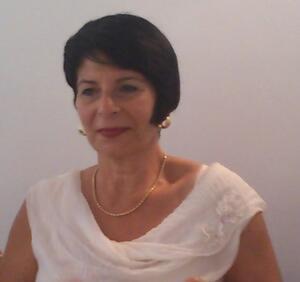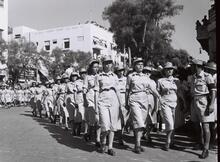Orit Adato
Orit Adato has held many roles throughout her career in security. She began her career in the Israel Defense Forces as commander in the Women’s Corps. In 1997, she was promoted to head of the Women’s Corps as a brigadier general at a time when the corps was in the process of being radically reorganized. After twenty-eight years of service in security, twenty-four of which were in the IDF, Adato retired with the rank of lieutenant general and founded her own international consultancy firm on security. Since 2004 she has led an initiative to advance the peace process by Israel’s release of security prisoners as a voluntary measure, as part of reciprocal steps between Israel and the Palestinian Authority, rather than an enforced action.
Scion of a family that has lived in the country for eight generations, Orit Adato was born in Haifa in 1955. Her father, Moshe Eliaz, who was born in Safed, completed high school and for a while studied at Haifa University. In 1946 he married Rachel Pardo (1924–1998), who was born in Haifa, earned a B.A. degree, and became a teacher. The couple had two sons older than Orit: Ben Zion (b. 1947) and Yaron (b. 1952).
Career in the Army
Adato enlisted in the IDF in 1973 and in due course served successively as commander of the two central Women’s Corps training bases (1994–1997), commander of the Women Teacher-Soldiers unit, and commander of the women in Nahal, where she directed the assistance given to immigrants from Ethiopia and the USSR. In 1997, she was promoted to the position of head of the Women’s Corps as a brigadier general, at a time when the corps was in the process of being radically reorganized. She thus played a critical role in determining the strategy of women’s military service and may be said to have initiated and implemented a breakthrough in the conditions of their service and its very nature. Her guiding principles were maximal exploitation of existing legislation, the Military Service Law, which determined gender equality in the IDF; transformation of the dominant attitude to women in the IDF; and energetic efforts to open a wider range of military professions, including combat professions, to women.
During her term of office, a basis was established for structural change both in the concept of the OC Women’s Corps and in the advancement of women. The widespread structure of the Women’s Corps was abolished in 1997 and specific responsibility for servicewomen (e.g., discipline) transferred to the officers in immediate command of them. What remained the responsibility of the OC Women’s Corps were the entire system of Chen officers in the District Commands and the armed forces; the women officers; Training Camp #12; and the basic training camp in Julis—all with a view to the ultimate separation from the Women’s Corps headquarters. The latter was henceforth to concentrate on specific women-related topics such as women’s health and sexual harassment, as well as on furthering and maximizing women’s potential contributions to the IDF. During Adato’s term of office, both the Chief of Staff and other commanding officers were enlisted to the cause of advancing women. As a result, combat roles (such as anti-aircraft units) and combat-supportive functions, such as shallow-water submarines, were opened to women, who were also integrated into technological units.
Other Work
Adato, who holds a B.A. in educational administration (1987) and an M.A. degree in political science (cum laude, 1993) from the University of Haifa, is also a graduate of the IDF National Security College and has been active in fostering Israel-United States relations. She was a member of the Prime Minister’s Committee on Women and in 1999 was a member of the Israeli delegation to the UN Committee on Women’s Rights. In 2000 she was appointed Commissioner of the Israel Prison Service—the first woman promoted to lieutenant general and the first person not promoted from the ranks of the police force to hold this position, in which she remained until 2003. Here she managed and directed a law-enforcement security agency at command, strategic, and operational levels, with overall responsibility for a staff of 4,500, 12,000 inmates in custody and 2,000 in community service.
Serving in this post for three and a half years, at the time of the second intifada, Adato was directly responsible for 3,500 security prisoners. During their hunger strike in May 2000, she conducted negotiations with the Palestinian Authority jointly with the General Security Services, effectively determining policy relating to these prisoners in a period during which three successive ministers for internal security were responsible for this aspect of government. She herself emphasized the humanitarian treatment of prisoners.
During her term of office Adato effected a breakthrough in the organizational culture of the IPS. She appointed women as commanders of seven of the country’s 21 prisons, promoted another to be the first woman officer with the rank of brigadier general, and posted others to significant positions.
Later Life
After 28 years of service in various activities related to security, 24 of them in the IDF, Adato retired with the rank of lieutenant general and founded her own consultancy firm, offering services at an international level on strategic action vis-à-vis terrorism, gangs, intelligence, and security. Her experience made her a respected and sought-after member of public and professional organizations such as the ICPA (International Correction and Prison Association), whose members include Saudi Arabia, the United Arab Emirates, Qatar, and Algeria, and of which she served as an elected vice-president. In 2011 Adato was awarded an honorary life membership by the International Corrections and Prisons Association. She is also a member of the American-Israel Friendship League and an elected board member of the Council for Peace and Security. Beginning in 2004, she led an initiative to advance the peace process by Israel’s release of security prisoners as a voluntary measure, as part of reciprocal steps between Israel and the Palestinian Authority, rather than an enforced action. She collaborated both with the US National Guard and with NATO in research on religious extremism and the recruitment of terrorists in prisons. In addition, she became involved in numerous voluntary activities, especially those concerned with Israel-
Lit. (Greek) "dispersion." The Jewish community, and its areas of residence, outside Erez Israel.Diaspora relations, such as Partnership 2000 and the Israel Forum.
In 1976 Adato married Joseph Paz (1953–2002), a mathematics teacher, with whom she had a daughter, Galit (b. 1977) and whom she divorced in 1980. In 1984 she married Yehoshua (Shuki) Adato (b. 1955), a restaurant manager and electronic engineer. The couple have a daughter, Adi (b. 1985), and a son, Ziv (b. 1987).




